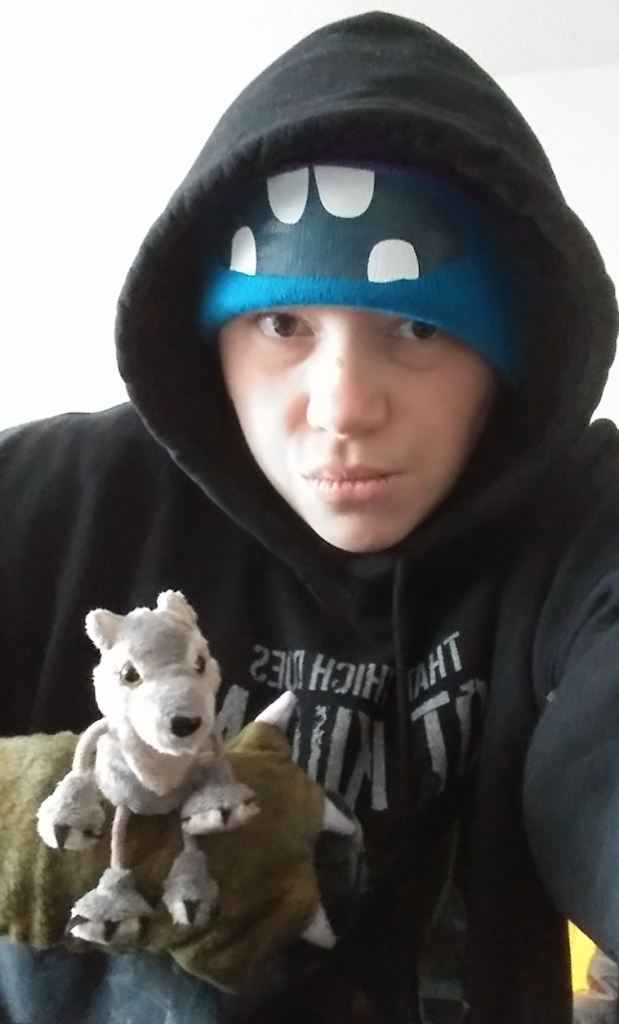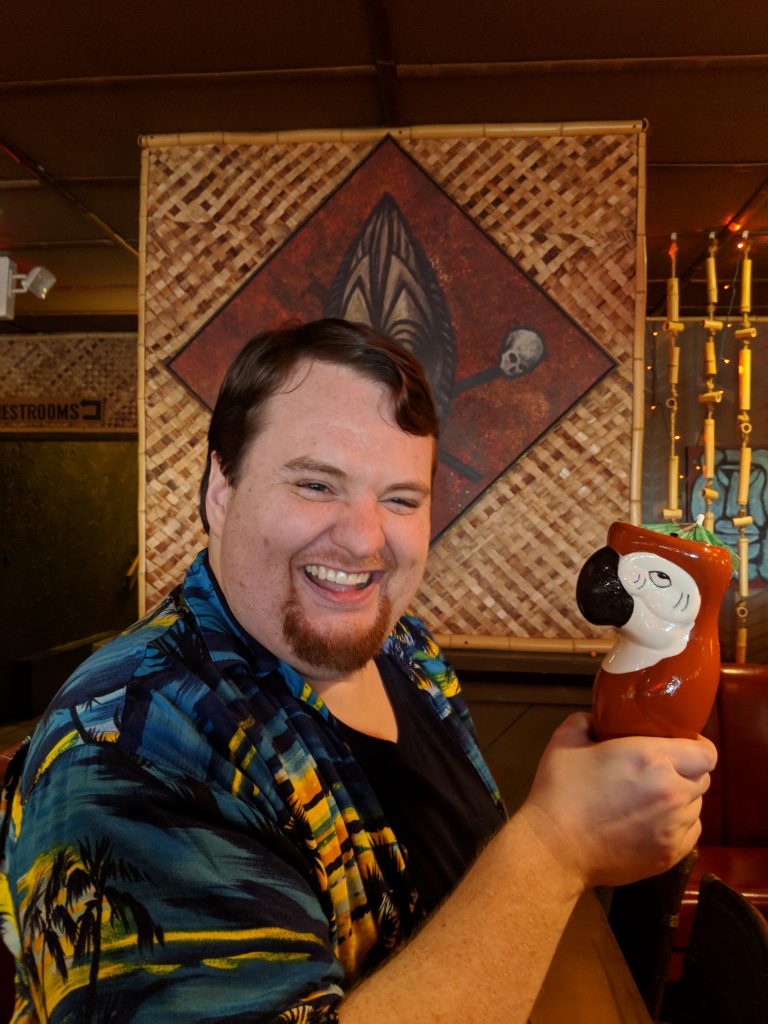Content note(click for details)
Content note: racism, including racial slursI brought Annie to my math-racist’s because I’d stolen a laptop from the Syndicate. I’d stirred the vipers’ nest. Their reach was long, and I didn’t have anywhere to take her. Last year, they’d killed Annie’s mother—a trained policewoman—using crooked cops from our own precinct. So Annie went where I went—even to Sanger’s beat-down porch.
I asked her to wait by the streetlamp, but she fingered her backpack. “Dad, why do you work with people who hate you?”
I winced internally: my nine-year-old knew about my racists. Like her mother, I used to be an upstanding officer. I’d repressed my ugly power. But now, I used racists freely. Last thing Annie’s mother would’ve wanted was for me to bring her to one.
Annie hadn’t asked why we ran when the black SUV approached our home this morning, why I’d smashed my phone, grabbed the laptop. But what she had asked was worse.
Why did my power work with people like Sanger?“Practice your Tai Chi over there, Annie.” She knew about my racists, but she didn’t have to know how I used them.
“But—”
“Please, pumpkin.”
She sighed and plodded to the streetlamp, started forms, the most graceful nine-year-old finding her center. Tai Chi helped me manage my power, so I’d taught it to her.
I tapped the doorbell, squeezing the briefcase containing the pilfered Syndicate laptop.
Sanger cracked open his door, peering out at me. My ability involved sensing prejudice, and Sanger’s pulled at my insides like a noose. Goosebumps riddled my skin, bones quivering underneath—and he hadn’t said anything yet. That’s how potent he was.
“Hiya,” I grunted.
When he opened fully, I gasped: his resentment practically squeezed my intestines. He grinned, relishing my discomfort. “Back for more, are we?”
I’d encountered him in town weeks back, ranting about “Chinks” overtaking American jobs. Sensing his math-potential, I’d followed him here, clutching my gut the whole time.
Now, I stood before him, letting him seethe at my Asian features, providing him with as much ammunition as possible. “Sanger,” I said, “are Asians accounting whizzes, or what?”
He snatched the bait like we were still in the same dialogue from last visit. “Chinks are so damned good at math! What else them slanted eyes for ‘sides counting beans?” He paused, eyes alight. Waiting.
I hated this part.
My eyes compressed into tight lines… but my mind quickened with mathematical know-how, accountancy laws. Sanger continued in a rapid-fire scree, my body shifting to obey. How nearsighted “Orientals” were!—my vision blurred; how short!—my height shrunk. He mentioned abacuses—one settled in my pocket.
I had what I needed.
Then Sanger paused. He enunciated his next words carefully, something he’d probably been rehearsing for weeks. “You need good bookkeeping… to track paddies like the bow-backed rice-picker you are!”
Goddammit.
My spine crooked, shoulders crunching. I was suddenly ankle-deep in water. Rice plantings shifted below me on a phantom breeze.
Sanger cackled at the paddy now consuming his lawn. He was a math-racist with job-racist tendencies, never varying from those themes. But sometimes racists changed, like hurricanes shifting direction. I’d been too distracted; I hadn’t sensed his food-racism.
Sanger saw Annie doing a Tai Chi toe-kick. “What the—?”
“Goodbye, Sanger.” He’d had his show. He could say whatever he wanted about me, but my daughter was off-limits.
He moved towards Annie, but I snarled. “I said goodbye.” Sanger swallowed, retreated behind his door. I paused to let my contortions settle, but a wet-sounding laugh fell around me.
“What are you—Racism-Man?”
I stumbled in my Sanger-given body.
Annie called over from the streetlamp. “Dad?”
“Stay there, pumpkin!” I sloshed round Sanger’s house, out of sight. I panted, too-thin eyes searching Sanger’s bushes, his cigarette-littered walkway. “Show yourself!”
White mist coiled toward the paddy’s edge, to what I realized were a trench coat and fedora, inflating them like some obscene balloon. As he solidified, a pulling sensation formed in my gut. Wispy hands produced sunglasses for a featureless face.
Rinehart. The Syndicate’s super-powered fixer.
I clutched my stomach. “You… like my power?”
“It’s definitely entertaining,” Rinehart said in his weird, wet voice, like he wasn’t using vocal cords. He indicated the paddy. “Similar to mine. More powerful, even, if you transform your surroundings.”
“First time that’s happened,” I admitted.
“Ah. You don’t understand your abilities yet.”
“There’s no manual. How’d you learn yours?” I wasn’t just stalling. Sometimes, super-powered people could learn from those with similar abilities. Experienced fliers could more or less teach newer fliers. Some super-powered people even teamed up, their abilities complementing each other in unexpected ways.
Rinehart shrugged. “Like you, following others’ dictates. Bowing to perceptions. But I wrested back control. It requires… a certain surrender…” He extended smoky fingers that roiled against the sunlight, digits wavering like flames, narrowing into talons, then becoming human fingers again.
I shivered. Rinehart definitely had more control over his body than I did mine. I needed people like Sanger, but Rinehart appeared able to mold his physicality any which way he wanted. Seemed he’d found his center. In Kung Fu, the center referred to one’s gravitational balance, and, by extension, one’s self-realization. If I kept using racists like Sanger, would I end like Rinehart?
“Surrender the laptop, and I’ll finish you quick. Your daughter doesn’t have to see you die.”
“You’re confident.”
“You’re a Chinky old farmer. You asked to be a Chinky old farmer.”
He’d tracked me, waiting until I was vulnerable before revealing himself. Yet judging from this stomachache he was giving me… “Ever see The Karate Kid? Remember Mr. Miyagi?”
Rinehart tilted his head, as if narrowing eyes behind his sunglasses—even though he didn’t have any.
“He was old, too. But he was formidable.”
My ability responded better to spoken or written slurs, but oftentimes my body shifted to racialized mental images. Sudden confidence streamed into me. I smirked, taking a Karate stance. He had seen that movie. He was a fight-racist.
Rinehart laughed. “That how your power works, Racism-Man?” His hands became smoke-tentacles, shooting for me.
I parried them. “Wax-on, wax-off!”
So many people insisted they didn’t have any racist bones in their bodies. Truth? That was like saying they’d never had any impure thoughts. Everybody contained a little racism. Granted, there were people like my past wife who didn’t give my power much to work with.
But Rinehart was potent. Boneless, maybe, but typical of what I encountered daily. I just had to keep feeding him cues. “Asians are brilliant martial artists—right, Rinehart?”
Whenever I struck, he became intangible—I hit mist, empty fabric—but he always solidified to attack. He quit laughing, intensifying his strikes.
“Remember Miyagi’s crane kick—KIYAH!”
My kick connected. Rinehart flew into the paddy, fedora and coat suddenly empty, floating on the water. A mist column plumed upwards, dissipating. Probably running to his SUV-driving minions.
I wheezed, straining under the weight of Asian-martial-mystique and mathematical stereotypes.
I grabbed the briefcase, shuffled to the lamppost, beckoned Annie over. The paddy reverted to browned grass, but my contortions remained.
“You okay, Dad?”
Before her mother’s passing, I never entered the house until whatever prejudices I’d gotten during the workday faded. Nothing big, maybe thinned eyes or a Manchurian queue. I’d practice Tai Chi until I normalized. As parents, officers, protectors of the community, we dreaded explaining racism to our daughter—something we couldn’t protect her from. How would the talk go? Pumpkin, people might treat you differently because of your appearance. Your race. But since the funeral, my contortions didn’t fade so quickly. In fact, they’d intensified, persisting despite hours of Tai Chi. In the past few months, I’d limped through our doorway countless times, cumbrous with slurs…
…and Annie never noticed. I should’ve been relieved. What parent wanted the world’s ugliness reflected in themselves before their children?
Today, like always, her eyes skipped over my stoop, my painfully slitted eyes.
Her mother wouldn’t see my contortions immediately; she’d have to really stare—but she saw eventually. Maybe, one day Annie would look at me, do a double-take. Maybe she’d cry at what she saw.
“Dad?”
“I’m fine, pumpkin.”
*
At a crosswalk, Annie side-eyed me. “This is about Mom, isn’t it?”
“No, pumpkin. It’s about…”
About unraveling why my transformations were worsening. It’d started when the Syndicate killed Annie’s mother. Maybe, if I put the Syndicate away, my body would right itself. But payback was a powerful side motivation.
“Yes. It’s about your mother’s murder.”
Annie nodded. She grabbed my crinkled hand and led me downtown. If Rinehart followed, he did so invisibly.
We made it to a café, where I activated the laptop. Time to deploy Sanger’s slurs. Last night, I’d read a technology-racist’s blog about Japanese programmers hacking (pun intended) America into “dericious” pieces. Like Sanger, the author was potent: I gained expertise to break the laptop’s encryption. But I also got buck-teeth making it hard to breathe. I fell asleep waiting for my body to re-center—awakening to the black SUV’s screech.
Annie stared out the window as I traced Syndicate sums through labyrinthine accounts. “Where’d you get the abacus?”
My fingers paused over the beads. “Where’d you learn that word?”
“Abacus? Maybe Mom said it once?”
I blinked, remembering the day she was referring to. Memories of the three of us together still hurt. I taught Annie Tai Chi so she’d find her center, but her mother was my self-realization. With her, I always knew who I was. On days when my body was being stubborn, she’d remind me Asians could speak English clearly, that our eyes were beautiful. Her words didn’t affect me, but they helped. Turning in my badge wasn’t just about hunting the Syndicate. It was also because I couldn’t identify as a cop anymore—as that honorable man my wife saw.
Nowadays, my keyring of racists dictated my identity.
“You’re my hero, Annie. You know that?”
This wasn’t a redirection. She was my hero. This invincible, shining light who kept me going, just by virtue of being herself.
“I know,” she said. “I’m sorry… about mentioning Mom just now. I know how you get whenever she comes up—”
“Annie. You never have to feel sorry about mentioning her. I’ve been so focused on… um, work. We should talk like we used to.”
I had more to say, but my blurry vision sharpened. Odd. I should’ve had hours yet in this form. Suddenly, I was sitting straighter, my eyes returning to their original shape.
“What if you quit the Mom-thing? What if you stopped dealing with bad people?”
“You… want me to quit?” My insides trembled. I returned to the laptop; I needed to find the accounting aberration before Sanger’s words fell off completely.
“Dad?”
“Now now, Annie—”
She pointed to the black SUV pulling up. With a tingle, my Sanger-given body and Miyagi-prowess vanished. But I’d gotten what I needed.
My wife had led the anti-Syndicate taskforce, and they’d killed her for that, but I saw to it—through my “dericious” technology-racists—that her file listing her family was redacted. Just in case, I’d switched Annie’s picture with a computer-generated image. I refused the official funeral, blocked our names from the press. I removed the house pictures, all visual evidence of Annie’s connection to us. I’m going after your mother’s killers, I’d explained. She’d nodded somberly.
Me, though? I’d been plumbing the Syndicate’s dens and safehouses.
I focused on the different pulls in the café: job-racism, politics-racism, movie-racism…
People thought racism was a white-vs-non-white thing. An upbringing thing. A class thing. Something happening in some-city in something-state.
Truth? Prejudice was as old as day, plentiful like dust. Outright racists like Sanger were most potent, but friendly racists also worked. People who’d never say Chink. People who thought themselves immune to prejudicial thinking (not a racist bone in my body!) because they voted for this proposal, kept diverse friends, married someone of this race. People who thought you couldn’t be racist against your own race—you totally could.
Annie packed the laptop while I spoke to a woman who thought all Asians looked alike. She meant it as a compliment. You Asians are youthful-looking!
I shuddered. Friendly racism didn’t yank as painfully as outright racism, but it prickled. Under the friendly intentions poked barbed micro-aggressions: Asians are youthful-looking—Inhuman; Asians are scientifically inclined—They’re only scientifically inclined; Asian females are so endearingly submissive—slavish.
As the woman talked, my skin shifted. Since my wife’s death, my ability had gone haywire, but my contortions eventually dropped. What about Asians who’d been told over and over how exotic they were, how obedient—for decades? How long did that kind of conditioning take to drop?
“If your hair were parted,” the woman continued, “you’d be my Vietnamese neighbor. He’s very handsome.”
“Like this?”
She squinted. “He has a beauty mark.”
“A mole? Around here?” I checked my reflection on the window. As expected, my face scrunched into this amalgam of Asian features, what she imagined as her neighbor’s face.
“What if your neighbor dyed his hair? Grew a beard?”
She couldn’t help but picture my suggestions; my body couldn’t help but react.
I left her gaping, collected Annie, and together we walked past the suited men exiting the SUV. One of them did a double-take at Annie. “Hey!”
Dammit—they’d uncovered my protective measures.
“Behind me, pumpkin. Take the briefcase.” Could I pull another Miyagi-contortion?
But Annie stepped forward. She was… glowing. I remembered telling her she was my hero. I remembered what I’d thought.
This invincible, shining light…
The Syndicate men flinched, backing away, like they weren’t hardened killers. I gaped as they retreated into their SUV, squealed off.
“I’ve… been meaning to tell you, Dad.”
She’d transformed to how I imagined her. She had power. No, not just that. I reacted to racial slurs and thoughts, but she’d reacted to my non-racial imagining. What did that mean?
“It’s… okay, pumpkin. We’re going to the police now.”
She squeezed my hand, and I faced her. But whatever words I’d started to find inside the café had disappeared.
“C’mon, pumpkin.”
*
I led Annie through streets thick with the pulls of job-racists who’d swear Asians were excellent cooks, camouflage-racists who thought Chinese and Koreans interchangeable, fight-racists who’d make me Bruce Lee if needed. We were the model minority, soft-spoken, subservient. We drove rice-rockets, and I’d led some crazy car chases. I told a teleport-racist I was Filipino; he demanded I return to my own country—I was transported to the Philippines, where I infiltrated the Syndicate’s Manila operations. An M. Butterfly fan, a gender-racist, talked me into becoming a lotus-flower woman. A sex-racist told me how beautiful Asians were. I’d gasped, grabbing my tightening crotch—she imagined Asians as well-endowed.
Other super-powered people levitated, walked through walls. They flew, shot fireballs. Me? I rode stereotypes.
Talking to Annie about racism—that she might suffer it, that she needed to resist doing it to others—would’ve been hard enough. Academics had written books trying to demystify the bewildering, tragic subject. But if Annie could access prejudice as a tool? What if, like me, she got overwhelmed by its brutal weight? Had she, all alone, experienced the gut-wrenching confusion of shaping to another’s will?
Before the police station’s entrance, I turned to her. “How long have you had your ability?”
She looked at me like I was the only thing in the universe. I wasn’t completely surprised by her power. Some abilities were passed genetically. That was why I’d insisted she practice Tai Chi.
She bit her lip. “Not long.”
I realized what I’d missed earlier. If Annie saw the abacus, then… my new mole… my beard…. “You see what I become,” I said dully. “You’ve seen all along.”
What if you stopped dealing with bad people?
What had it been like for her, hearing people call me things like “slant-eyed gook”? Then to see me actually become that?
She looked down. “You’re disappointed, aren’t you?”
I hated that anyone would call her “slant-eyed gook”. I especially hated that with her powers, her body would contort. But I had something to offer: my experiences with my ability, learning to think quickly, to twist prejudice into something useful. Questions I could answer for her, while I had to be my own clumsy teacher.
“I’m disappointed because I didn’t want you to see me at my worst. But I’m never disappointed in you, Annie. Nothing’s changed. You’re my hero. You’re always my hero.”
She smiled at that, a natural smile I hadn’t seen in a while. We entered the station—one different from my former precinct. I’d vetted everybody here for corruption, but nobody knew me. I shoved a coded note into the drop-box at the windowed reception grill. The attending officer shot me a look before hurrying off.
“Annie, do you know why finding your center’s so important? Your mother was mine. She reminded me who I was.”
“Dad, I—” she started, but a sergeant interrupted from behind the window.
“You’re the undercover asset? The one dropping us Syndicate intel?”
I nudged Annie back, lifted the laptop. “I’ve got the evidence.”
“I thought you’d be taller.”
I grunted as my spine started stretching. I’d tell Annie first that prejudice hit you without warning. You couldn’t feel every racial pull. Only tall people—of this skin color, this gender, this biological composition—did things that mattered. I gritted my teeth as I elongated to obey that premise.
In that unhinged moment, Rinehart struck.
Vapor streamed from a ceiling vent, sluiced through the grill, a human-shaped smog pulling a gun from the drop-box—the sergeant yelled, grabbing his empty holster—
I threw myself around Annie. She breathed into my ear. The gun barked, like the “Chink!” shot from Sanger’s lips, demanding my body obey, that I form holes and blood.
I looked up. Rinehart appeared confused.
Officers clamored against the reception window’s other side. Rinehart had jiggered the door. Why wasn’t I dead?
Then I registered what Annie had said into my ear, what my body couldn’t help but mirror: “You’re my hero, Dad.”
What exactly did my daughter imagine a hero could do? How potent was her belief in me?
The bullet, mashed against my back, pinged onto the floor as I straightened. Rinehart fired his entire clip, bullets thunking off me.
He tossed the gun. “The key to controlling my ability, Miyagi-sensei—” my bones started warping— “was to embrace people’s dictates. To surrender to smoke.”
He slammed me into the window, stunning me. “It’s wonderfully freeing.”
I grabbed his solid shoulders. But Rinehart reformed, shoulders becoming tentacles that hurled me into the ceiling. “Surrender, Fu Manchu!” He’d learned from our last encounter, was trying to overload my body. I dropped to the floor, sprouting a Fu-mustache. “Surrender, dragon-lady!” Torn between stereotypes, my limbs creaked… my fingertips flaked… bleaching of color… whitening… like smoke…
“Surrender, Racism-Man! Ssssssurrender!”
“No!” Annie shouted. She was glowing again. Rinehart flinched from her light.
“Stop listening to bad people, Dad! Just stop! You’re—my—hero.”
Her mother couldn’t talk me out of transformations. Even the image in her mind couldn’t erase what strangers said about me. Yet Annie thought I was bulletproof. She’d made me bulletproof. Why had her words worked?
Sometimes, super-powered people could learn from those with similar abilities.
Some super-powered people even teamed up, their abilities complementing each other in unexpected ways.
When my body had mysteriously normalized in the café, I’d been opening up to Annie. That was it. I had to listen to her. “Keep talking, pumpkin! It’s helping!”
“Oh, just die already!” Rinehart stretched smoky limbs towards Annie’s light, but snatched them back, as if scalded.
“I want you to hang our pictures again!” she said.
That wasn’t what I’d been expecting. But hearing my daughter’s words felt good. My warped limbs started loosening. “I’m listening!”
“I want to talk about Mom without worrying it’ll make you sad!” A dam had broken loose. She was crying, but my flaking hands solidified, normal color returning.
And I was crying too. I’d thought I was protecting her, but I’d been blocking her out.
“Sad? I’ll show you sad!” Rinehart rose like a storm cloud.
“I want to remember things like Mom showing you how to build a campfire!”
Campfire?
I stood, and breathed fire—yes, fire—at Rinehart. I was a quick thinker, after all. He spilled to the floor as a blackened, human-shaped fog.
“I know who I am, Rinehart. I’m a hero. I’m her hero.”
He growled. “Whatever, Hero-Man.” He vaporized, wafting slowly through the ceiling vent, as if wounded. Rinehart couldn’t be solved in one decisive battle. We’d face each other again.
Officers burst into the reception area. The laptop lay where I’d dropped it. Hopefully, it still worked, but destroying the Syndicate on my own terms seemed much more appealing to me.
Annie took my hand. “I… have more to say.”
In Kung Fu, you knew you’d found your center when you found a place with no pull, where you just were. Maybe the key to finding balance wasn’t destroying a criminal organization or getting revenge, or hiding racism from my daughter, but with something as simple as hearing her out.
I looked into Annie’s eyes. “I’m listening.”
© 2020 by Andrew K Hoe
Author’s Note: I remember my parents trying to explain to me, a Chinese American child in the 1980s, what racism was. I remember that talk being so difficult, and tried picturing how I might explain racism to a child of my own in the 21st century. Racism is extremely nuanced and difficult to verbalize. It’s far more complex than a collection of verbal slurs, and being anti-racist takes much more than vowing never to say certain ugly words. In my daily experiences, I’ve encountered people who passionately decry racism, but don’t realize they enact, through their everyday speech and actions, the very racist behaviors they denounce. When confronted with evidence of their racism, they’re the first to claim “I’m not racist” or “I don’t have a racist bone in my body.” The tragic circumstances of George Floyd’s murder and the Black Lives Matter protests have forced many to acknowledge that “systemic racism,” “white supremacy,” “microaggression,” and “implicit bias” are actual dangers that continue to threaten BIPOC, trans-, and other marginalized peoples. Yet there are stories of victimized groups having turned the tables by using their oppressors’ racism against them. For example, David Henry Hwang’s play M. Butterfly deals with the real life Chinese male spy who successfully used stereotypes of Asian women to fool a French diplomat into thinking he was a woman. The two had sexual relations with the diplomat being none the wiser. Rinehart is a character from Ralph Ellison’s Invisible Man, who forsakes his racial identity to adapt to white society. In writing this story, I wondered—what if a hero could weaponize the racism used against him? What would happen if he could use racism as a superpower?

Andrew K Hoe practices Kung Fu and writes fiction in Southern California. He has been an assistant language teacher in Japan. He is thrilled to have a story featured in Diabolical Plots, one of his favorite speculative fiction venues.
If you enjoyed the story you might also want to visit our Support Page, or read the other story offerings.









